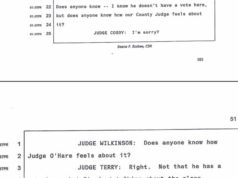Legislative Antics
Conservative Texas legislators have until May 31 to show us that they used their time in Austin to restrict women’s access to reproductive care, support lax gun laws, and weigh in on which sports transgender students can and can’t play. Senate Bill 8 would ban abortions when a fetal heartbeat is discernable while House Bill 1927 aims to strip the need for a license as a requirement for carrying a handgun. A slew of dangerous laws is potentially heading to Gov. Greg Abbott’s desk before the end of the month. These three bills in particular caught out attention.
Voter Restriction Law Approved by Texas House
Voter suppression works. Decades of gerrymandering, mail-in ballot restrictions, and similar efforts have left Texas with a legislature that is 61% white even though just over 40% of Texans identify by that race. Of 99 Republican senators and state representatives, 95% of them are white. Texas’ largely white, largely male (73%) governing body — with the vocal support of Abbott — recently approved a voting restrictions bill that aims to protect the staunch whiteness and maleness of the Texas lege for years to come.
On Friday, the House passed SB 7 after making several changes to the original bill. Since it differs significantly from the Senate bill, a conference committee will work to resolve the differences before the proposal is signed by Abbott and becomes law. Several provisions that passed in the Senate, like the banning of drive-through voting and redistribution of polling sites away from Black and Hispanic communities, did not survive House deliberations. The cutting of the more heinous voting restriction proposals may have been an attempt to dodge federal lawsuits that are basically the only remaining protection for voting rights in Republican-led Texas. The John Lewis Voting Rights Advancement Act, if passed by Congress in D.C., could end Texas’ never-ending push to disenfranchise non-Republicans by requiring federal approval of all voting law changes made in the Lone Star State.
As passed by the House, SB 7 would criminalize any attempt to provide applications to vote by mail to individuals who did not request a mail-in ballot. The use of public funds to support the third-party distribution of vote-by-mail ballots would be prohibited, and poll watchers would gain new protections under the current bill.
The Republican-led effort to disenfranchise non-Republicans from the ballot box follows similar trends across the South. President Joe Biden’s landslide November victory was followed by baseless claims of voter fraud by prominent Republican officials in Texas and across the country. More than 60 of the former president’s lawsuits — some filed by political allies and others filed by The Former Guy (TFG) — were dismissed, even in cases where the federal judge was appointed by TFG. The lone instance where TFG’s lawsuit found success didn’t even deal with alleged voter fraud but rather the amount of time Pennsylvania voters had to fix errors on their mail-in ballots, according to PolitiFact.
In March, the Brennan Center for Justice, a nonpartisan law and justice institute, tallied 361 bills that are intended to restrict voting. With 49 such bills in deliberation at the time, Texas led the country in trying to restrict one of the most fundamental rights afforded to U.S. citizens.
Backing the Blue with Lots (and Lots) of Green
Few careers offer the job security of law enforcement. Fort Worth’s police department gobbles up around one-third of the city’s general fund, and police union dues are used to steer local elections through campaign contributions and in-kind political ad programs. Given the unmatched financial and political sway of Fort Worth’s police department and similar law enforcement agencies across Texas, HB 1900 may be more political propaganda than an attempt at meaningful legislative reform.
The bill, which would basically defund large cities that reduce police budgets, is a rebuke of the massive protests that shook the nation and Fort Worth following the murder of Black man George Floyd by white cop Derek Chauvin last summer. Those protests called for the reallocation of a portion of public funds from police budgets to social and community services and for a greater means of holding police accountable to the citizens they are charged with serving. The House recently passed HB 1900, which is similar to a bill passed by the Senate.
Profiteering off the Poor
Cash bail, also known as monetary bail, remains one of the most glaring examples of how the U.S. criminal justice system favors the wealthy and criminalizes poverty. Once arrested for a Class B Misdemeanor or higher in Tarrant County, men and women are presented to a magistrate judge who earns $142,000 a year. The magistrate sets a bond amount as a condition of release. The average bail set in Tarrant County in 2019 for Class A and B misdemeanors and all felonies, according to the Tarrant County Criminal Court Administrator, was $4,785.09.
The antiquated idea behind bond is that defendants will show up to court to retrieve their bond, which is basically a deposit. For-profit bail bond companies profiteer off mass incarceration by offering defendants bail bond loans for a fee (typically of 10%). Last week, the Texas House of Representatives passed HB 20, which is alternatively known as the Damon Allen Act after a slain state trooper who was killed by a known offender who was released on bond. The act would require magistrate judges to use risk-assessment tools when setting bail amounts. The bill does nothing to address the impoverished inmate population that languishes and not infrequently dies in Texas’ jails.
Tragic stories of crimes perpetrated by individuals who are out on bond are often used to justify the existence or even strengthening of monetary bond, but those very real public safety concerns have to be weighed against the tens of thousands of innocent men and women who are jailed simply because they cannot pay bond amounts of as little as $100.
Texas Jail Project, a nonprofit that documents the mistreatment of Texas inmates, recently released a report card on Tarrant County’s jails. Nearly 2,600 people in Tarrant County are pretrial, meaning they have not been found guilty and are presumed to be innocent, the report found. The annual cost of jailing a man or woman in Tarrant County’s jail is $26,445 per year. The nonprofit said 17 jail custody deaths were recorded in 2020, including the death of Javonte Myers, a 28-year-old Black man who was charged with trespassing and given a $250 bail that he could not afford. Myers died of medical complications related to seizures he had while being held in Tarrant County Jail. In a public statement, Myers’ mother, Sandrea Miller, said her son was never a threat to public safety.
“If anything, the jail and the $250 bond was a threat to his life and safety,” she said.












